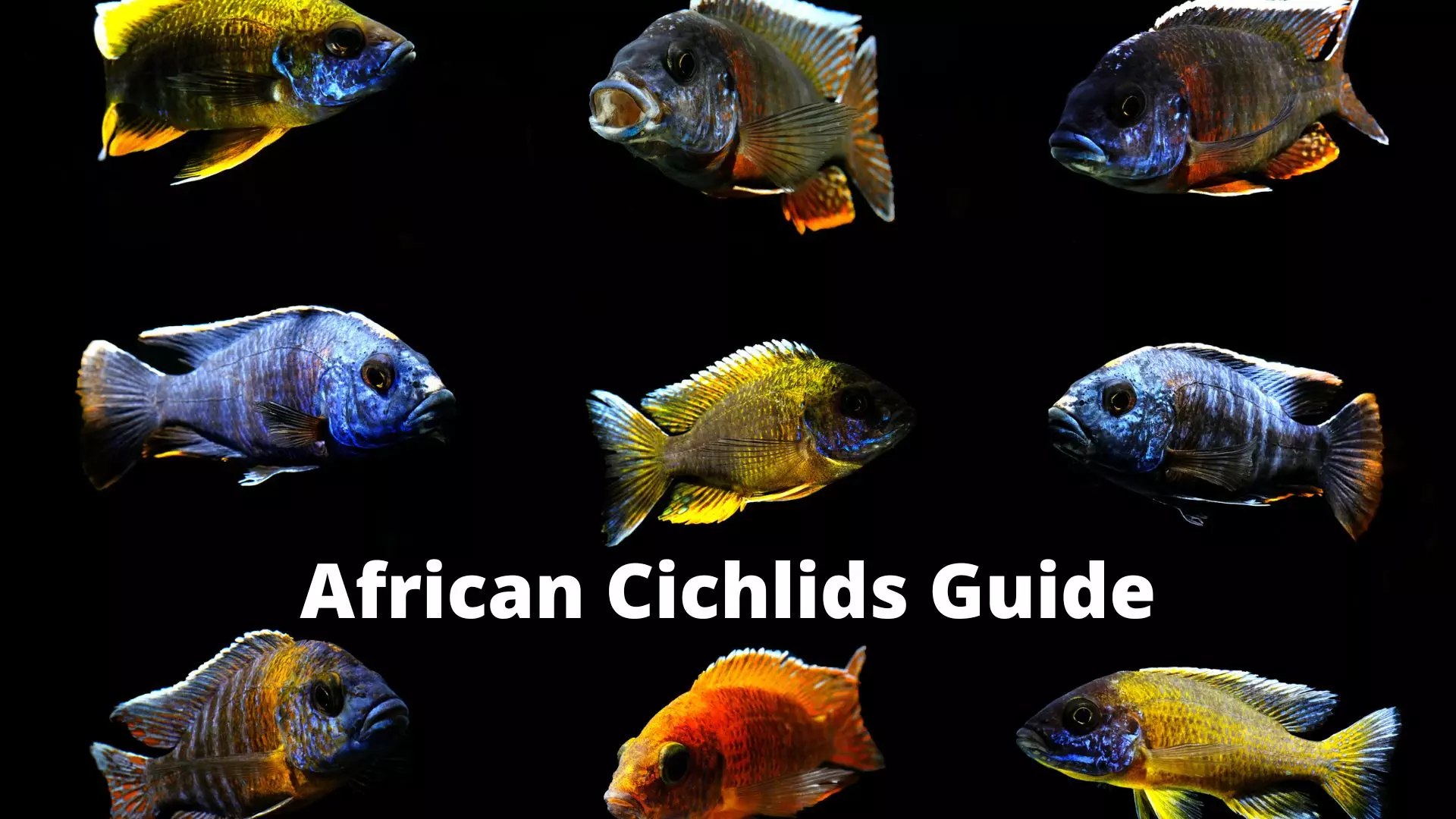Rabbit Poop – Here’s Everything You Need to Know About It
Gaining a comprehensive understanding of rabbit poop is a critical aspect of responsible pet ownership.
This is because analyzing their droppings can provide valuable insights into their overall health and well-being.
It can provide information about what they are eating, how well they are digesting their food, and whether they have any underlying health issues.
By paying close attention to their droppings, you can ensure that your rabbit is healthy and happy.
In this blog post, we will delve deeper into the world of rabbit poop.
We will examine what healthy rabbit poop looks like, what changes in their droppings may indicate health problems, and how to properly clean up their waste.
Additionally, we will discuss the use of rabbit manure as fertilizer and the role it can play in maintaining the health of your garden.
We’ll also talk about how to stop your dog from eating rabbit poop, just in case your dog has been eating rabbit poop.
Whether you are a seasoned rabbit owner or just starting out, this guide is a comprehensive resource that will help you understand everything you need to know about rabbit poop.
From identifying what is normal to recognizing when it’s time to seek veterinary help, we will cover all the essential information you need to ensure that your rabbit stays healthy and happy.
So, let’s dive in and explore the fascinating world of rabbit poop!
What Does Rabbit Poop Look Like?
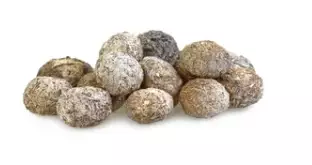
Rabbit poop is small and round, and typically measures between 0.5 and 1 cm in diameter.
It is usually dark in color, ranging from dark brown to black and has a smooth texture.
It’s often referred to as “pellets” and is quite firm, making it easy to pick up and dispose of.
Why is Rabbit Poop Important?
Rabbit poop is an important indicator of a rabbit’s health. If you notice a change in the appearance or frequency of your rabbit’s poop, this could be a sign of a health issue.
Additionally, rabbit poop is a valuable source of fertilizer, making it a great addition to your garden or compost pile.
It is also a good way to monitor what your rabbit is eating and to identify any dietary changes that may need to be made for their wellbeing.
Types of Rabbit Poop
There are two main types of rabbit poop: cecotropes and fecal pellets.
Cecotropes Rabbit Poop
Cecotropes are soft and moist, and are typically consumed by the rabbit directly from their anus.
They are an important part of a rabbit’s diet as they contain beneficial bacteria and are an important source of nutrients for the rabbit.
These type of poop is usually dark brown or black in color and have a different texture and appearance than fecal pellets.
Fecal Pellets Rabbit Poop
Fecal pellets are the small, round droppings that we typically associate with rabbit poop.
They are made up of undigested food and are usually the result of the rabbit’s cecotropes being further broken down in the digestive system.
These are the type of poop that is most commonly seen in a rabbit’s litter box or cage.
How Often Do Rabbits Poop?
On average, rabbits will produce around 100 faecal pellets per day.
This can vary, however, based on factors such as age, diet, and overall health.
If you notice a significant increase or decrease in the number of faecal pellets your rabbit is producing, it is important to consult with a veterinarian.
What Does it Mean if My Rabbit’s Poop Changes?
If you notice a change in the appearance or frequency of your rabbit’s poop, this could be a sign of a health issue.
Some common causes of changes in rabbit poop include:
Diet
A change in diet can cause a change in the appearance and frequency of your rabbit’s poop.
If you have recently changed your rabbit’s diet, this could be the cause of the change.
For example, if your rabbit is not getting enough fiber in their diet, this can cause their poop to become soft and smelly.
Illness
If your rabbit is sick, this can cause a change in its poop.
Some common illnesses that can affect rabbits include digestive problems, bladder problems, and parasites.
For example, if your rabbit has digestive problems, this can cause its poop to become loose and runny.
Stress
Stress can also cause changes in your rabbit’s poop.
If you have recently introduced a new pet to your household, or if your rabbit has been exposed to a stressful situation, this could be the cause of the change.
Stress can cause rabbits to have fewer bowel movements.
Do Rabbits Eat Their Poop?
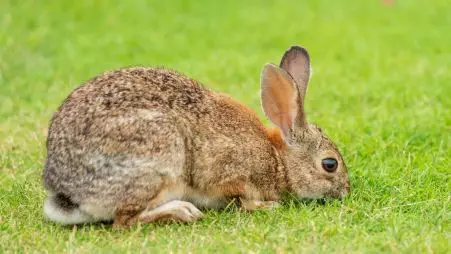
Yes, rabbits eat their poop. This behaviour is called “coprophagy” and is a natural part of a rabbit’s digestive process.
Rabbits produce two types of droppings: hard round droppings, which are the solid waste, and soft, oval-shaped droppings, which are the partially digested food.
Rabbits will consume the soft droppings, which are high in protein and essential vitamins and minerals, to help them extract as much nutrition from their food as possible.
This behaviour helps to keep the rabbit’s digestive system functioning properly and also helps to conserve nutrients and moisture in their body.
Additionally, when rabbits eat their poop, they help to keep their living environment clean by reducing the amount of waste they produce.
Does Rabbit Poop Smell?
Rabbit poop generally has a mild and earthy odour. Unlike other types of animal manure, rabbit manure does not have a strong or unpleasant odour.
This is partly due to the fact that rabbits have a highly efficient digestive system, which results in less waste and a lower volume of manure.
Additionally, the dry and compact consistency of rabbit poop means that it is less likely to produce an overpowering odour compared to other types of manure.
However, it is important to clean the rabbit’s living area regularly to prevent any buildup of manure, which can increase the likelihood of unpleasant odours.
Rabbit Poop Color
Rabbit poop color can vary, but it is typically brown or dark brown.
The exact color can depend on the rabbit’s diet, hydration levels, and overall health.
For example, if a rabbit is eating a lot of green leafy vegetables, their poop may be a lighter green color.
If the rabbit is dehydrated, the poop may be harder and darker in color.
Healthy rabbit poop should be firm and well-formed, and the rabbit poop color should be consistent.
If you notice a significant change in the rabbit poop color or consistency of your rabbit’s poop, it may indicate a health issue and it is recommended to seek veterinary advice.
Why Dogs Eat Rabbit Poop
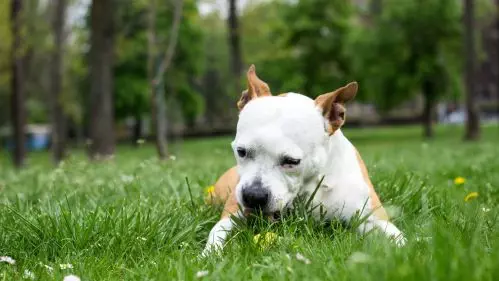
It is not uncommon for dogs to eat rabbit poop.
This behaviour, known as coprophagia, can be caused by a variety of factors including boredom, lack of proper nutrition, or a behavioural issue.
Eating rabbit poop can also be a natural instinct for dogs, as it is a way for them to obtain additional nutrients or to maintain their environment clean.
However, eating rabbit poop can also be harmful to dogs, as it can expose them to parasites, bacteria, and other pathogens.
Additionally, the digestive system of a rabbit is different from a dog’s, and the nutrients found in rabbit poop may not be appropriate or easily digestible for a dog.
If your dog is eating rabbit poop, it is important to supervise them and discourage this behaviour.
You can also try providing more mental and physical stimulation, as well as adjusting their diet to provide proper nutrition.
If the behaviour continues, it may be necessary to consult with a veterinarian to rule out any underlying medical or behavioural issues.
How To Stop Your Dog From Eating Rabbit Poop
Here are some steps you can take to help stop your dog from eating rabbit poop:
Increase Exercise and Mental Stimulation
Dogs that are bored or lack physical and mental stimulation may engage in eating rabbit poop i.e. coprophagia.
Make sure your dog gets enough exercise, playtime, and mental stimulation each day. Consider taking your dog for walks, playing interactive games, and providing puzzle toys to keep them engaged.
Feed a Nutritious Diet
Make sure your dog is eating a balanced and nutritious diet. If your dog is not getting enough nutrients from their food, it may look for other sources, such as rabbit poop.
If you have concerns about your dog’s diet, consult with a veterinarian to ensure they are receiving the proper nutrients.
Supervise Your Dog
When your dog is outside, make sure to supervise them and remove any rabbit poop that is within their reach. This will help to prevent your dog from eating it.
Use Deterrents
If your dog continues to eat rabbit poop, you can try using deterrents to discourage this behaviour. For example, you can try using a bitter spray or citrus-scented products on the rabbit poop to make it less appealing to your dog.
Training
Positive reinforcement training can be effective in stopping coprophagia. Every time your dog goes near the rabbit poop, say a command such as “leave it” and reward them with a treat or praise when they obey.
With consistent training, your dog should eventually learn to avoid eating rabbit poop.
It’s important to keep in mind that some dogs may continue to eat it despite your best efforts to stop this behaviour.
If this is the case, it may be necessary to consult with a veterinarian to rule out any underlying medical or behavioural issues.
With patience, persistence, and a consistent approach, you should be able to help your dog overcome this behaviour.
Is Rabbit Poop Good Fertilizer?
Yes, rabbit poop is considered to be a good fertilizer.
Rabbit manure is rich in nitrogen, phosphorus, and potassium, which are essential nutrients for plant growth.
It is also considered a “cold” manure, meaning that it has a low level of heat production, making it safe to use directly on garden plants without the risk of burning them.
Additionally, rabbit manure is compostable and can help to improve soil structure and fertility.
However, it is important to note that fresh rabbit manure should be composted before being used in the garden, as it can contain harmful bacteria that can infect plants or humans.
Composting the manure will help to break down these pathogens and make the manure safe to use as fertilizer.
How To Use Rabbit Poop As Fertilizer
Here is a step-by-step guide on how to use rabbit poop as fertilizer:
Collect the Rabbit Manure
Collect the rabbit manure in a clean container. Make sure to avoid collecting any litter, bedding, or other material along with the manure.
Compost the Manure
Fresh rabbit manure should be composted before being used as fertilizer.
This will help to break down any harmful bacteria and pathogens and make the manure safer to use.
To compost rabbit manure, mix it with other compostable materials such as leaves, grass clippings, and food waste.
Maintain the compost pile by turning it regularly to ensure proper aeration and to promote decomposition.
Prepare the Soil
Once the rabbit manure has been fully composted, it is ready to be used as fertilizer.
Prepare the soil by removing any weeds, rocks, or debris.
Then, incorporate the composted rabbit manure into the soil using a garden fork or cultivator.
Apply the Manure
Spread the composted rabbit manure evenly over the soil.
Depending on the type of plants you are growing, you can apply the manure around the base of the plants or mix it into the soil.
Avoid applying too much manure at once, as this can lead to nutrient imbalances and harm the plants.
Water the Plants
After applying the composted rabbit manure, water the plants thoroughly to help the nutrients from the manure get absorbed into the soil.
Note: It is important to be mindful of the age and health of the rabbits whose manure you are using. If the rabbits are sick, their manure may contain harmful pathogens and should not be used in the garden.
Additionally, it is always a good idea to wash your hands thoroughly after handling any type of manure, including rabbit manure.
Using rabbit poop as fertilizer can be a cost-effective and eco-friendly way to provide essential nutrients to your garden plants.
Just remember to compost the manure before using it, and to be mindful of the age and health of the rabbits whose manure you are using.
Is Rabbit Manure Better Than Cow Manure?
It depends on the intended use and the specific needs of the plants. Both rabbit and cow manure have their own unique benefits and disadvantages.
Advantages of Rabbit Manure (Rabbit Poop)
1. Higher in nitrogen
Rabbit manure is higher in nitrogen compared to cow manure, making it ideal for green leafy vegetables and other plants that require high levels of nitrogen for growth.
2. Lower in volume
Rabbit manure is lower in volume compared to cow manure, making it easier to handle and transport.
3. Lower in heat production
Rabbit manure is considered a “cold” manure, meaning that it has a lower heat production compared to cow manure, making it less likely to burn plants.
4. Lower in pathogens
Rabbit manure is lower in pathogens compared to cow manure, making it safer to use directly on plants without the need for composting.
Advantages of Cow Manure
1. Higher in phosphorus
Cow manure is higher in phosphorus compared to rabbit manure, making it ideal for flowering and fruiting plants that require high levels of phosphorus for flower and fruit development.
2. Higher in volume
Cow manure is higher in volume compared to rabbit manure, making it a more cost-effective option for large-scale gardening or farming operations.
3. Higher in organic matter
Cow manure contains more organic matter compared to rabbit manure, making it ideal for improving soil structure and fertility.
The choice between rabbit and cow manure as a fertilizer depends on the specific needs of the plants and the intended use.
Both have their own unique benefits and it may be necessary to use a combination of both for optimal results.
The Last Word On Rabbit Poop
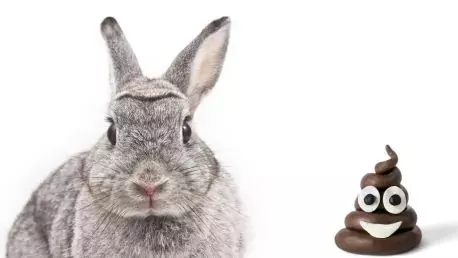
In conclusion, rabbit poop is a complex and important aspect of rabbit care that should not be overlooked.
From its role in digestive health to its potential use as fertilizer, understanding the intricacies of rabbit droppings is crucial for ensuring your pet’s well-being.
By paying close attention to their poop and recognizing the signs of potential health problems, you can provide your rabbit with the best possible care.
While discussing rabbit poop may not be the most enjoyable topic, it is essential for responsible pet ownership.
The knowledge you gain from studying your rabbit’s droppings can help you make informed decisions about their diet and overall health, leading to a happier and healthier pet.
So, embrace the topic of rabbit poop, and use the information you learn to provide your furry friend with the love and care they deserve.
Loved the above post on rabbit poop? Please support us by sharing it 🙂
